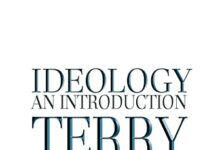
Ebook Info
- Published: 2017
- Number of pages: 192 pages
- Format: PDF
- File Size: 0.89 MB
- Authors: Terry Eagleton
Description
A brilliant introduction to the philosophical concept of materialism and its relevance to contemporary science and cultureIn this eye-opening, intellectually stimulating appreciation of a fascinating school of philosophy, Terry Eagleton makes a powerful argument that materialism is at the center of today’s important scientific and cultural as well as philosophical debates. The author reveals entirely fresh ways of considering the values and beliefs of three very different materialists—Marx, Nietzsche, and Wittgenstein—drawing striking comparisons between their philosophies while reflecting on a wide array of topics, from ideology and history to language, ethics, and the aesthetic. Cogently demonstrating how it is our bodies and corporeal activity that make thought and consciousness possible, Eagleton’s book is a valuable exposition on philosophic thought that strikes to the heart of how we think about ourselves and live in the world.
User’s Reviews
Reviews from Amazon users which were colected at the time this book was published on the website:
⭐I’ve steadily added a bit of social and political philosophy to my reading over the last couple of years, and this seemed like it might be an interesting bridge between my metaphysical interests and politics. I was also intrigued as Dr. Eagleton comes at a philosophical subject from a literary viewpoint. The literature he reviews here is mostly ninteenth and twentieth century Anglo-Euopean philosophy but Aristotle and especially Aquinas, are referenced as well. The author is (or was, now retired perhaps) a professor of English literature and well known literary critic, but social and political philosophy seem to be of particular interest to him.The book begins with a broad overview of meanings of the word ‘materialism’. Dr. Eagleton briefly covers the ground from metaphysical and epistemological materialism, going together today broadly as “scientific materialism”, naturalism, and scientism. In what follows he mostly ignores the metaphysical, but the epistemological, our capacity to know only from experience, always underlies what follows. He distinguishes other kinds of materialism, humanistic, structural, somatic, and on down to its trivial use meaning “desire for material (often culture-related) things”. He tells us that the focus of the book is on the somatic, or what he calls also “anthropological materialism” though he says neither term is quite right. The essence of this though becomes the lens through which he explores the main theme of the book. Briefly summarized, the “somatic materialist” ignores all the issues of metaphysical materialism and mostly accepts epistemological materialism by simply taking it for granted that the body is the principle vehicle of individuation (how people distinguish other people) and that the body happens to be a “thinking thing” (usually including the animals). What somatic materialists emphasize is the contribution added by the world, by our growing up and living in it, and perhaps most of all by the language we learn to use. In fact somatic materialists are likely to believe that these obviously influential and indisputably physical environments come to entirely define and structure what inner life we have. The meaning of a word (for example) is not something we experience in some inner domain, some private subjectivity, but in how we and others use that word in our behavior!Dr. Eagleton signals his awareness of various issues with this view though he doesn’t much explore them. Rather, the rest of the book goes into how the above idea, this notion of “somatic materialism” which allows that matter can think and doesn’t much ask how, deals with the human condition in which it finds itself. He continues to make use of philosophers and other thinkers mostly of the nineteenth and twentieth centuries, but his focus and time goes to Nietzsche, Marx, and Wittgenstein. Given this starting point, philosophy naturally addresses the social. The second half of the book, its last three chapters, is an examination of how somatic materialism plays out in the thought of these authors, on what the three take to be the nature of “being human”. Eagleton is keen to recognize parallels and crucial differences between all three thinkers. His own explication is sensible and easy to follow while his scholarship is excellent. His references amount to a who’s who of social philosophy over the past two centuries, and he is not above an occasional reference to Aristotle and often to Thomas Aquinas. Dr. Eagleton is very good here. I think mostly people with an interest in one or more of these three philosophers, in particular their relation broadly to the materialist view of the combined “society-body-mind” idea, will find this the best part of the book.Overall I found the book an enjoyable read not only for its philosophical insights and unusual balance on the issues, but also its style and sense of humor. In some books authors make aside remarks that come across a bit snide! Dr. Eagleton’s text is peppered with asides, but they contribute to his theme by carrying much of the work’s philosophical balance. The author is a good writer as well as a good thinker, a talent served well no doubt by his literary background.
⭐An accurate study about the topic.
⭐Very good book. It started slow, but the last to chapters were very good; the Nietzsche chapter High Spirts was one of the best reads on Nietzsche I’ve seen.
⭐Eagleton got a hold of this one and hit out of the park
⭐In this book it felt like Eagleton didn’t have a firm grasp of what he wanted to say. It felt more like reading the stream of consciousness of a very bright and well read individual, who never the less had no overall point he wanted to land.Although there were interesting moments, on the whole I did not enjoy this book.
⭐Terry Eagleton entertains and instructs.
⭐It is very difficult to follow the definitions and examples of historical, dialectic, somatic, and speculative materialism. There is an attempt to relate bodily senses to realities like language development. There is an introduction to the inter-body material philosophy of Aquinas, Marx, Nietzsche and Wittgenstein with smatterings of Kant, Hobbes, Locke and others. Eagleton compares these philosophies from history and politics to language, ethics, aesthetics and to a view of life and thought before reverting to political ideology.It seems ridiculous to promote Marxism by rejecting Nietzsche. Most of the book is polemical squirming on the trade-off between the mind’s grasp of rationalism and a realization of empiricism. Politics is buried in psycho babbling double talk like: “Capital is a phantasmal body, a monstrous doppelganger which stalks abroad as its masters sleep, mechanically consuming the pleasures they austerely forgo.” It seems to me that enlisting philosophy in a political theme should have a basis in the realty of engaging with the world. This stream of conscientiousness out of body exercise doesn’t touch reality. It’s mostly ideological sophistry. While Wittgenstein expressed a suspicion that classical philosophy was useless, Eagleton proves it.
⭐Gets close to a biological philosophy. Best at linking Marx, Freud and Wittgenstein through Nietzsche to their Aquinus roots. Nevertheless the linearity and Eurocentric approach in the end fail to convince. A great read for a non-professional.
⭐A new Terry Eagleton book is like a box of handmade chocolates. Full of revealing moments and a treat throughout and when finished there’s little to show for it but the memory of the pleasure of eating/reading it. His style is so clear you can almost skim through hair raising philosophical assertions and exegesis without pausing to draw breath as it were, to assimilate the material I suppose I mean. This is due also to the authority in his style. At any rate for those of us who value the intellect it is an invitation to spend a few hours with some of the greats, in close proximity thanks to Eagleton’s unswerving instinct for what’s really at issue. Anyone familiar with his (recent) work will recognise the talent reviewed in this volume, Aquinas, Marx, Wittgenstein, and Nietzsche, with ref. to Freud and the Frankfurt school among others. An absolute pleasure.
Keywords
Free Download Materialism in PDF format
Materialism PDF Free Download
Download Materialism 2017 PDF Free
Materialism 2017 PDF Free Download
Download Materialism PDF
Free Download Ebook Materialism





